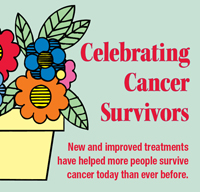 More people in the U.S. are living longer after a cancer diagnosis. For this increasing number of cancer survivors, living a better quality of life is just as important as living through the disease. Improving communication and acknowledging stress can enhance the quality of life of cancer survivors and those who support them.
More people in the U.S. are living longer after a cancer diagnosis. For this increasing number of cancer survivors, living a better quality of life is just as important as living through the disease. Improving communication and acknowledging stress can enhance the quality of life of cancer survivors and those who support them.
“Connecting with others can be vital to effectively adapt to what many term as a ‘new normal’,” said Frances A. Zandstra, RN, OCN, director of the Cancer Survivorship Program at The University of Texas M. D. Anderson Cancer Center.
A cancer survivor is commonly defined as anyone who has been diagnosed with cancer, from the time of diagnosis and treatment through the remaining years of life. M. D. Anderson uses the term “cancer survivor” to describe people who have been diagnosed with cancer and the people in their lives who are affected by the diagnosis, including family members, friends and caregivers.
Finding new ways to connect with a doctor or health care provider, spouse, caregiver, family members, friends and coworkers takes time and effort on both sides.
Find Ways to Regain Closeness
“As a cancer survivor, it’s important to let people know what you need. This is the first step to reconnecting,” Zandstra said
For spouses, friends and family members, finding new ways to generate closeness also is important. “It’s important to ask the cancer survivor ‘What do you need?’,” Zandstra said. “Showing them you’re willing to make that effort is crucial to building strong relationships.”
Connect With Your Doctor
For cancer survivors, developing a dialog with a health care team member can help take away that fear of the unknown. A health care provider can help survivors develop a follow-up plan with a suggested schedule for exams and check-ups to screen for cancer recurrence, as well as diseases/side effects that may result from treatment.
“If you have a new question or concern, please contact your health care team,” said Zandstra. It is a patient’s right and responsibility to ask questions. “Keep asking questions until you understand what your health care team is saying and what you need to do to take care of yourself.”
Small Actions Make a Big Difference
Connecting with cancer survivors can mean understanding and acceptance. Take the time to learn what that person needs and what feels good within the “new normal.”
Ways for friends, family members and caregivers to reconnect with survivors include:
- Talking
- Listening
- Finding humor
- Creating memorable moments
- Touching
- Sharing moments of silence
“It’s the little things that people often take for granted that can really make a difference,” Zandstra said.
New and improved therapies are allowing an increasing number of people to enjoy a full life after cancer treatment. According to the National Cancer Institute, more than 10 million cancer survivors are alive in the U.S. today. About 14 percent of those survivors were diagnosed more than 20 years ago. Sixty four percent of adults diagnosed with cancer today can expect to be alive in five years.
For additional information on cancer survivorship, visit Cancer Awareness & Prevention.
Source: MD Anderson Cancer Centre, University of Texas
